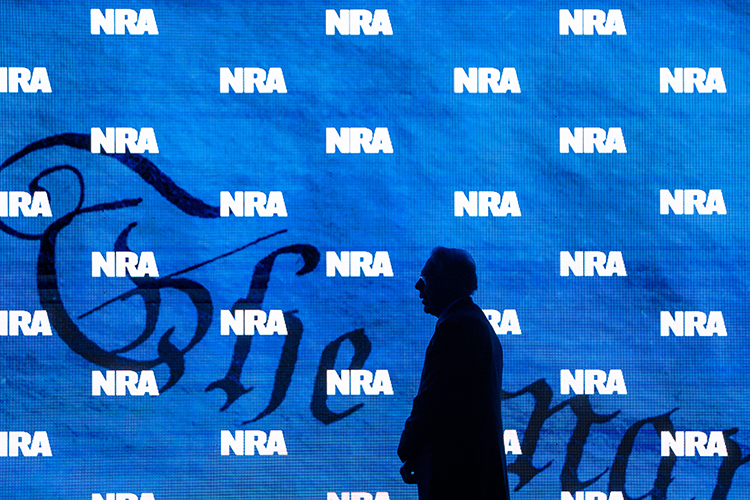Supreme Court rules for NRA in First Amendment suit over official's alleged 'pressure tactics'

The National Rifle Association's then-CEO, Wayne LaPierre, appears onstage during the 2023 National Rifle Association annual convention. (Photo by Demetrius Freeman/The Washington Post via Getty Images)
Updated: The First Amendment prevents government officials from using their power to selectively punish or suppress speech that the government disfavors, the U.S. Supreme Court ruled Thursday in a lawsuit by the National Rifle Association.
Justice Sonia Sotomayor wrote the opinion for a unanimous court.
The NRA had sued over alleged “pressure tactics” employed by a New York official to get banks and insurers to cut ties with the association. The defendant was Maria Vullo, then the superintendent of the New York Department of Financial Services. The department oversees insurance companies and financial services institutions.
Vullo is accused of pressuring the institutions after the February 2018 mass shooting at the Marjory Stoneman Douglas High School in Parkland, Florida, that killed 17 people.
Vullo referred to the Parkland shootings in guidance letters to banks and insurers. The letters pointed to “social backlash” against the NRA and other groups “that promote guns that lead to senseless violence.” She cited instances of businesses that cut ties with the NRA as examples of companies “fulfilling their corporate social responsibility,” according to allegations in the NRA suit.
Vullo and then-New York Democratic Gov. Andrew Cuomo issued a joint press release citing the same kind of concerns.
Less than two weeks later, the New York Department of Financial Services entered into a consent decree with Lockton Companies, which had affiliates that offered affinity insurance programs for the NRA, and with Chubb Limited, one of the underwriters.
The decree said the NRA affinity program known as Carry Guard violated New York insurance law because it covered intentional criminal acts and because the NRA promoted it without a license.
Another underwriter, Lloyd’s of London, then instructed its syndicates to end contracts with the NRA.
The decision followed a private meeting in which Vullo brought a variety of insurance law violations to Lloyd’s of London’s attention, including “technical infractions that allegedly plagued the affinity insurance market in New York and that were unrelated to any NRA business,” Sotomayor said, citing the NRA’s allegations.
Vullo allegedly said she would be less interested in pursuing the infractions if Lloyd’s of London stopped providing insurance to gun groups.
If the allegations are true, Vullo went too far, Sotomayor said.
Also from SCOTUS this week: 9th Circuit ‘all but ignored’ aggravating factors in death-penalty case, Supreme Court says
“Vullo was free to criticize the NRA and pursue the conceded violations of New York insurance law,” Sotomayor wrote. “She could not wield her power, however, to threaten enforcement actions against DFS-regulated entities in order to punish or suppress the NRA’s gun-promotion advocacy. Because the complaint plausibly alleges that Vullo did just that, the court holds that the NRA stated a First Amendment violation. … A government official can share her views freely and criticize particular beliefs, and she can do so forcefully in the hopes of persuading others to follow her lead. In doing so, she can rely on the merits and force of her ideas, the strength of her convictions, and her ability to inspire others. What she cannot do, however, is use the power of the state to punish or suppress disfavored expression.”
One relevant factor, Sotomayor said, is the type of power wielded by the government official.
“Generally speaking,” she wrote, “the greater and more direct the government official’s authority, the less likely a person will feel free to disregard a directive from the official.”
The Supreme Court had agreed only to consider the First Amendment question. The federal appeals court that considered the issue had held that even if the NRA did plausibly state a First Amendment violation, Vullo was entitled to qualified immunity because the law was not clearly established.
On remand, the 2nd U.S. Circuit Court of Appeals at New York “is free to reconsider whether Vullo is entitled to qualified immunity,” according to a footnote in the opinion.
Vullo is represented by Neal Katyal of Hogan Lovells, a former U.S. acting solicitor general, who said in a statement he and his client were disappointed by the decision.
“As the court’s decision makes clear, because of the posture of this case, this ruling required the court to treat the NRA’s untested allegations as true, even though these allegations have no evidentiary merit,” Katyal said. “The NRA’s allegations about the Lloyd’s meetings are false, and Ms. Vullo did not threaten, coerce or retaliate against anyone in the performance of her duties. … Ms. Vullo did not violate anyone’s First Amendment rights. Ms. Vullo enforced the insurance law against admitted violations by insurance entities, and industry letters such as those issued by Ms. Vullo are routine and important tools regulators use to inform and advise the entities they oversee about risks.”
The case is National Rifle Association of America v. Vullo.
Hat tip to SCOTUSblog.
Updated May 30 at 1:50 p.m. to include Neal Katyal’s statement.



